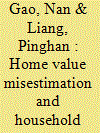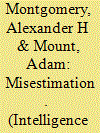| Srl | Item |
| 1 |
ID:
168350


|
|
|
|
|
| Summary/Abstract |
Households often make errors when self-assessing their housing wealth. By using the Chinese Households Finance Survey, we show that Chinese urban households systematically overestimate their home value. This bias is significantly related to household consumption: a one standard deviation increase in the extent of estimation bias is associated with a 10% increase in household consumption. Our main results are robust against a variety of robustness checks, e.g., taking into account the expectations of future home price, using the interviewee's estimation as the instrumental variable for the household self-estimation, implementing the hedonic model on an external data source to assess real homevalue, etc.. Further, we show that overestimated households are more likely to take risk in financial market, and have a larger amount of immediate and conspicuous consumption. These findings have policy implications for the recent debate about property tax, indicating the unintended consequences of property tax through providing more precise information about home value.
|
|
|
|
|
|
|
|
|
|
|
|
|
|
|
|
| 2 |
ID:
131604


|
|
|
|
|
| Publication |
2014.
|
| Summary/Abstract |
Various policy options have been proposed for slowing or halting the spread of nuclear weapons, yet all rely on sound intelligence about the progress of nuclear aspirants. Historically, the United States' record of estimating foreign weapons programs has been uneven, overestimating the progress made by some proliferators while underestimating others. This paper seeks to catalogue and evaluate the intelligence work surrounding 16 of the 25 states that are thought to have pursued nuclear weapons and to provide a framework for evaluating the causes of distorted intelligence estimates of nuclear proliferation. In particular, we identify 12 specific hypotheses related to politics, culture, bureaucracy and organizational culture, then explore how they play out in practice through two case studies (North Korea and Israel). We find that the US has overestimated nuclear programs much more frequently than it has underestimated or correctly estimated them.
|
|
|
|
|
|
|
|
|
|
|
|
|
|
|
|